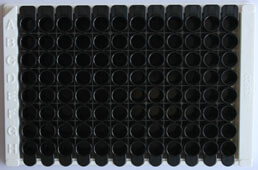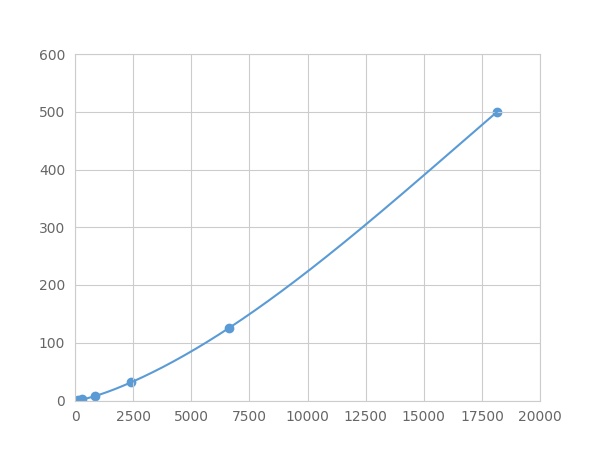Packages (Simulation)

Reagent Preparation

Image (I)
Image (II)
Certificate


Multiplex Assay Kit for Fibrinogen Degradation Product (FDP) ,etc. by FLIA (Flow Luminescence Immunoassay)
FnDP; Fibrin Split Products; Fibrin Degradation Product
(Note: Up to 8-plex in one testing reaction)
- Product No.LMA530Ra
- Organism SpeciesRattus norvegicus (Rat) Same name, Different species.
- Sample Typeplasma
- Test MethodDouble-antibody Sandwich
- Assay Length3.5h
- Detection Range0.49-500pg/mL
- SensitivityThe minimum detectable dose of this kit is typically less than 0.163 pg/mL.
- DownloadInstruction Manual
- UOM 8Plex 7Plex 6Plex 5Plex 4Plex 3Plex 2Plex1Plex
- FOB
US$ 427
US$ 443
US$ 468
US$ 501
US$ 534
US$ 583
US$ 657
US$ 821
Add to Price Calculator
Result
For more details, please contact local distributors!
Specificity
This assay has high sensitivity and excellent specificity for detection of Fibrinogen Degradation Product (FDP) ,etc. by FLIA (Flow Luminescence Immunoassay).
No significant cross-reactivity or interference between Fibrinogen Degradation Product (FDP) ,etc. by FLIA (Flow Luminescence Immunoassay) and analogues was observed.
Recovery
Matrices listed below were spiked with certain level of recombinant Fibrinogen Degradation Product (FDP) ,etc. by FLIA (Flow Luminescence Immunoassay) and the recovery rates were calculated by comparing the measured value to the expected amount of Fibrinogen Degradation Product (FDP) ,etc. by FLIA (Flow Luminescence Immunoassay) in samples.
| Matrix | Recovery range (%) | Average(%) |
| serum(n=5) | 84-93 | 89 |
| EDTA plasma(n=5) | 90-99 | 95 |
| heparin plasma(n=5) | 94-101 | 98 |
Precision
Intra-assay Precision (Precision within an assay): 3 samples with low, middle and high level Fibrinogen Degradation Product (FDP) ,etc. by FLIA (Flow Luminescence Immunoassay) were tested 20 times on one plate, respectively.
Inter-assay Precision (Precision between assays): 3 samples with low, middle and high level Fibrinogen Degradation Product (FDP) ,etc. by FLIA (Flow Luminescence Immunoassay) were tested on 3 different plates, 8 replicates in each plate.
CV(%) = SD/meanX100
Intra-Assay: CV<10%
Inter-Assay: CV<12%
Linearity
The linearity of the kit was assayed by testing samples spiked with appropriate concentration of Fibrinogen Degradation Product (FDP) ,etc. by FLIA (Flow Luminescence Immunoassay) and their serial dilutions. The results were demonstrated by the percentage of calculated concentration to the expected.
| Sample | 1:2 | 1:4 | 1:8 | 1:16 |
| serum(n=5) | 84-98% | 87-98% | 85-97% | 85-96% |
| EDTA plasma(n=5) | 88-96% | 78-97% | 83-99% | 94-101% |
| heparin plasma(n=5) | 97-104% | 78-104% | 81-104% | 80-93% |
Stability
The stability of kit is determined by the loss rate of activity. The loss rate of this kit is less than 5% within the expiration date under appropriate storage condition.
To minimize extra influence on the performance, operation procedures and lab conditions, especially room temperature, air humidity, incubator temperature should be strictly controlled. It is also strongly suggested that the whole assay is performed by the same operator from the beginning to the end.
Reagents and materials provided
| Reagents | Quantity | Reagents | Quantity |
| 96-well plate | 1 | Plate sealer for 96 wells | 4 |
| Pre-Mixed Standard | 2 | Standard Diluent | 1×20mL |
| Pre-Mixed Magnetic beads (22#:FDP) | 1 | Analysis buffer | 1×20mL |
| Pre-Mixed Detection Reagent A | 1×120μL | Assay Diluent A | 1×12mL |
| Detection Reagent B (PE-SA) | 1×120μL | Assay Diluent B | 1×12mL |
| Sheath Fluid | 1×10mL | Wash Buffer (30 × concentrate) | 1×20mL |
| Instruction manual | 1 |
Assay procedure summary
1. Preparation of standards, reagents and samples before the experiment;
2. Add 100μL standard or sample to each well,
add 10μL magnetic beads, and incubate 90min at 37°C on shaker;
3. Remove liquid on magnetic frame, add 100μL prepared Detection Reagent A. Incubate 60min at 37°C on shaker;
4. Wash plate on magnetic frame for three times;
5. Add 100μL prepared Detection Reagent B, and incubate 30 min at 37°C on shaker;
6. Wash plate on magnetic frame for three times;
7. Add 100μL sheath solution, swirl for 2 minutes, read on the machine.
GIVEAWAYS
INCREMENT SERVICES
| Magazine | Citations |
| Am J Physiol Lung Cell Mol Physiol | The role of the E2F1 transcription factor in the innate immune response to systemic LPS Physiology: Source |
| Bone Marrow Transplant. | Thrombomodulin alleviates murine GVHD in association with an increase in the proportion of regulatory T cells in the spleen Pubmed:25243628 |
| Nephrology Dialysis Transplantation | The efficacy of recombinant human soluble thrombomodulin for the treatment of shiga toxin associated hemolytic uremic syndrome model mice Pubmed:25694534 |
| Gastroenterology | Inhibition of Plasmin Protects Against Colitis in Mice by Suppressing Matrix Metalloproteinase 9–Mediated Cytokine Release From Myeloid Cells Sciencedirect:S0016508514014851 |
| Gastroenterology | Inhibition of Plasmin Protects Against Colitis in Mice by PubMed: 25490065 |
| Haematologica | Cytoprotective and pro-angiogenic functions of thrombomodulin are preserved in the C loop of the fifth epidermal growth factor-like domain Pubmed:29903766 |
| Bone | Temporary inhibition of the plasminogen activator inhibits periosteal chondrogenesis and promotes periosteal osteogenesis during appendicular bone fracture … 10.1016:j.bone.2018.04.016 |
| Thrombosis andHaemostasis | Nebulized anti-coagulants as a therapy for acute lung injury and acute respiratory distress syndrome Pubmed: 29202212 |
| Critical care | Co-administration of iloprost and eptifibatide in septic shock (CO-ILEPSS)—a randomised, controlled, double-blind investigator-initiated trial investigating … Pubmed: 31488213 |
| Journal of Thrombosis and Haemostasis | Effects of nebulized antithrombin and heparin on inflammatory and coagulation alterations in an acute lung injury model in rats Pubmed: 31755229 |
| Catalog No. | Related products for research use of Rattus norvegicus (Rat) Organism species | Applications (RESEARCH USE ONLY!) |
| LMA530Ra | Multiplex Assay Kit for Fibrinogen Degradation Product (FDP) ,etc. by FLIA (Flow Luminescence Immunoassay) | FLIA Kit for Antigen Detection. |




